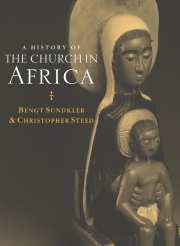Book contents
- Frontmatter
- Contents
- List of maps
- Acknowledgements
- List of abbreviations
- Introduction
- PART I THE FIRST FOURTEEN HUNDRED YEARS
- PART II THE MIDDLE AGES 1415 – 1787
- PART III THE LONG NINETEENTH CENTURY 1787 – 1919
- PART IV THE COLONIAL EXPERIENCE 1920 – 1959
- PART V INDEPENDENT AFRICA 1960 – 92
- 18 Introduction to Independent Africa
- 19 North and North-Eastern Africa
- 20 West Africa
- 21 Central Africa
- 22 Southern Africa
- 23 East Africa
- 24 Ecumenical Perspectives
- 25 Epilogue
- Notes
- Bibliography
- Name index
- Subject index
19 - North and North-Eastern Africa
from PART V - INDEPENDENT AFRICA 1960 – 92
Published online by Cambridge University Press: 16 September 2009
- Frontmatter
- Contents
- List of maps
- Acknowledgements
- List of abbreviations
- Introduction
- PART I THE FIRST FOURTEEN HUNDRED YEARS
- PART II THE MIDDLE AGES 1415 – 1787
- PART III THE LONG NINETEENTH CENTURY 1787 – 1919
- PART IV THE COLONIAL EXPERIENCE 1920 – 1959
- PART V INDEPENDENT AFRICA 1960 – 92
- 18 Introduction to Independent Africa
- 19 North and North-Eastern Africa
- 20 West Africa
- 21 Central Africa
- 22 Southern Africa
- 23 East Africa
- 24 Ecumenical Perspectives
- 25 Epilogue
- Notes
- Bibliography
- Name index
- Subject index
Summary
THE MAGHREB
The Church's history in the Muslim north – the Maghreb – is of special interest: the precarious existence of a tiny Catholic minority in ‘a sea of Islam’. In Independent Africa as a whole, after 1960, the Church has increasingly gained in number and influence. The Muslim north represents the exception to this rule. Here, one should not expect impressive Church statistics or loud and rabble-rousing revival. Instead there is a discreet Christian presence, through prayer and service – where service is at all possible and allowed – and a deep spirituality expressed in devotion and meditation, related to the hidden life of Jesus in Nazareth, our Lady of Africa and ‘the saints of Africa’.
The modern Christian history in these countries was determined, and delimited, by the revolutionary upsurge against French colonialism after World War II. In Algeria this led to a bitter civil war during eight long, terrible years, with consequent French surrender and exodus, and Algerian rule under Ben Bella. In Tunisia, after a conflict of much shorter duration, the country's independence was assured under the Paris-trained lawyer and journalist Habib Bourguiba.
While concerned primarily with daily problems in an ever-changing political and social situation, the Church in Algeria and Tunisia was able to derive inspiration from its relation to history. These lands hallowed by the memory of St Cyprian and St Augustine and the other early Christian martyrs appear to the Catholic as emblazoned by sacred history.
- Type
- Chapter
- Information
- A History of the Church in Africa , pp. 918 - 931Publisher: Cambridge University PressPrint publication year: 2000



